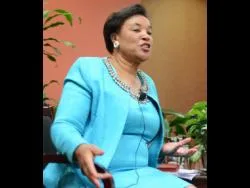
It is likely to be very surprising to most Caribbean citizens that the issue of reparations for slavery is not formally on the agenda of the Commonwealth.
Which, on the face of it, is a major failure of the Caribbean Community (CARICOM) and its commission on reparations. The matter, therefore, requires an explanation from the community, as well as the commission’s chairman, Hilary Beckles. More importantly, they must close this obvious loophole, unless there are compelling strategic considerations that have, up to now, hindered action on that front.
The Commonwealth is an organisation of 56 countries, which are mainly former colonies of Great Britain. A dozen of those members are in the Caribbean, a region of many small islands where Europeans pioneered plantation slavery as a critical input in a major economic activity – the growing of sugar cane and the manufacture of sugar. The region had the greatest concentration of black people as chattel.
Additionally, 19 of the other Commonwealth members are in Africa, from where, over more than three centuries, twelve and a half million people were shipped to the Americas to be slaves.
COMMONWEALTH AN APPROPRIATE FORUM
For more than a decade, CARICOM has been at the forefront of efforts to have European slave nations acknowledge the wrongs, formally apologise, and pay reparations for the injustices they wrought.
It would have been expected that the Commonwealth – whose titular head is the king of Great Britain and Northern Ireland, the leading slaving nation – would be an appropriate forum within which to pursue the issues of reparatory justice. And that its Caribbean members would have been robust in pressing for the issues to be on its agenda.
However, the organisation’s secretary general, Baroness Patricia Scotland, told this newspaper that the matter is not one being formally pursued by the Commonwealth.
“There has been no specific call for the Commonwealth to be the platform [for reparations],” Baroness Scotland said.
Most probably, her appreciation of the clear anomaly of this situation is what elicited Baroness Scotland’s acknowledgement that the Commonwealth “could be a suitable platform for that debate”, in the same way that the group became a loud and moral voice for the dismantling of apartheid in South Africa, and in its advocacy for action to reverse global warming and climate change.
But, as Baroness Scotland said of the Commonwealth – which does not have a formal treaty and makes decisions by consensus – “nobody can force them to put things on the agenda if they don’t wish it”. Which begs the question of why the countries of the Caribbean and Africa, who account for 55 per cent of the Commonwealth’s members, have not sought to place reparations at the forefront of its agenda. Whatever sensitivities that may have precluded such as move should be transparently and frankly discussed.
Nearly three years ago, in the face of the global reckoning inspired by the Black Lives Matter movement, The Gleaner declared its support for reparations: not merely for the descendants of slaves to receive (by whatever mechanism this would be accomplished) compensation on behalf of their ancestors, but as part of a broader fulfilment of justice for the gross abuse of human rights, including genocide. And as of a promise of ‘never again’.
TWO NOTEWORTHY FACTS
Should this characterisation of chattel slavery and the benefits derived by enslavers be ever questioned, two facts are noteworthy. At the ‘abolition’ of slavery by Britain in 1834, British slave owners received £20 million in compensation for the loss of their property – human beings.
That payment amounted to 40 per cent of the UK government’s income at the time, and five per cent of the country’s GDP. The present-day value in its broader economic terms is several billions of pounds. The bonds the British government issued to finance that payment was cleared only in 2015. The payout fuelled the wealth of many British families and helped to finance a second British ‘Industrial Revolution’.
The former slaves received no compensation. Moreover, despite ostensibly being freed in 1834, they were, in many cases, required to provide free labour for a further four years. Euphemistically, this period of further exploitation was called ‘apprenticeship’.
The second issue is the analysis by Jamaican sociologist Professor Orlando Patterson of the demographics of the slave population in Jamaica at the end of slavery, compared to the American south.
Professor Patterson noted that between 1650 and 1830, just over one million Africans were brought to Jamaica, compared to roughly 388,000 who went to North America, explained largely by the difference in wealth of the two regions, particularly Jamaica’s importance as a sugar producer.
At slavery’s end, fewer than 400,000 slaves were in Jamaica, compared to two million slaves in the US in 1830. The difference between those figures is a measure of how plantation owners in the two territories managed their slaves. In Jamaica, the economics of slavery and the relative cost of replacing new bodies with imports meant that Jamaican slaves were more expendable.
Using regression analysis, Professor Patterson determined that Jamaica’s immediate post-slavery population should have been over 5.73 million. The difference between the expected number and the actual black population was the result of what he called “the protracted genocide of Jamaican slaves because of their treatment”. This genocide played out to varying degrees across the British, French, Dutch, Spanish and slave colonies in the West Indies.
Reparations is one of the deeply moral issues that awaits a just solution. It is why it must be on the agenda of the Commonwealth.


